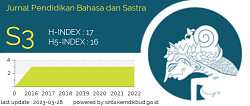INDONESIAN TERTIARY STUDENTS’ ATTITUDES TOWARDS THE USE OF LOCAL CULTURE VS TARGET CULTURE READING MATERIALS IN ENGLISH READING CLASS
Abstract
This paper aims at portraying Indonesian tertiary students’ attitudes towards the use of local and target culture reading texts in English reading classes with regard to today’s role of English. It has been widely recognized that today’s role of English is as an international language (EIL) and as a lingua franca (ELF). Regarding this international role of English language, ideally teaching and learning English should be matched with appropriate pedagogical approach, in this case, EIL pedagogy approaches. In other words, teaching and learning EIL should be different from teaching and learning of any other second or foreign languages. Since Indonesia is categorized as an EFL country, it is interesting to find out whether this issue has an impact on ELT practices such as English reading class in this country. The subjects of the study are first year English Education Department students. The data were gained by delivering Likert scale questionnaire to the students on their attitude towards the reading materials given to them in one semester. In addition to this, an interview was conducted to verify the data and gain further information. The findings revealed that in general they show positive attitude to both local culture and target culture reading materials, with the majority of them prefer reading target culture reading materials. Furthermore, a considerable number of the students also acknowledge the importance of the use international culture along with English language teaching.
Full Text:
PDFReferences
Anderson,R. &Pearson, P. 1984. “A Schema-theoretic View of Basic Processes in Reading Comprehension.” In P. Pearson (Ed.), Handbook of Reading Research, New York: Longman.
Byram, M. &Flemming, M. (Eds.) 1998.Language Learning from an Intercultural Perspective.Cambridge: Cambridge University Press.
Cobuild, C.2006. Dictionary. Australia: Collins Cobuild.
Cortazzi, M., & Jin, L. 1999. “Cultural mirrors: Materials and methods in the EFL classroom”. In E. Hinkel (Ed.), Culture in second language teaching and learning (pp. 196-219). Cambridge: Cambridge University Press.
Creswell. J.W. 2007. Available online http://www.sagepub.com/upm-data/22780_Chapter_1.pdf.
Crystal, D.1997. English as a Global Language. Cambridge: Cambridge University Press.
Fisher, D. & Frey, N.2009.Background Knowledge: the Overlooked Factor in Reading Comprehension. New York: McGraw Hill Education.
Gibbons, P.2002. Scaffolding Language, Scaffolding Learning: Teaching Second Language Learners in the Mainstream Classroom. NH: Heinemann.
Holliday, A.2009. “English as a Lingua Franca, ‘Non-native Speakers’ and Cosmopolitan Realities”. In F. Sharifian (Ed.), English as an International Language: Perspectives and Pedagogical Issues (pp.21-33). Bristol: Multilingual Matters, St Nicholas House.
Jenkins, J. 2006.”Current Perspectives on TeachingWorldEnglishes and English as a Lingua Franca”. TESOL Quartertly, 40 (1), pp.157-181.
Lin, Z.2002. “Discovering EFL Learners’ Perception of the Prior Knowledge and its Roles in Reading Comprehension”. Journal of Research in Reading, 25(2), pp.
Llurda, E. 2009. “Attitudes Towards English as an International Language: The pervasiveness of native Models Among L2 Users and Teachers”. In F. Sharifian (Ed.), English as an International Language: Perspectives and Pedagogical Issues (pp.119-134). Bristol: Multilingual Matters, St Nicholas House.
Luke, A. & Freebody, P.1990. “Literacies’ Programs: Debate and Demands in Cultural Context”. Prospect 5(3), pp.7-16.
McKay, S. L.2003a. “Toward An Appropriate EIL Pedagogy: Reexamining Common ELT Assumption”. International Journal of Applied Linguistics, 13(1), pp. 1-22.
McKay, S. L. 2003b. “EIL curriculum development”. RELC Journal, 34(1), pp. 31-47.
McKay, S. L.2009a. “Pragmatics and EIL Pedagogy”. In F. Sharifian (Ed.), English as an International Language: Perspectives and Pedagogical Issues (pp.227-241). Bristol: Multilingual Matters, St Nicholas House.
McKay, S. L.2009b. “Source Culture or Target Culture. CAPE Teacher Talk 43”. From http://www.cape.edu/teachertalk.html.
Miftah, R.2013. “The Use of Local Culture Texts for Enthusiastic English Reading Teaching”. The International Journal of Social Science, 7(1), pp. 130-135.
Robert, P. and Canagarajah, S. 2009. “Broadening the ELF Paradigm: Spoken English in an International Encounter”. In F. Sharifian (Ed.), English as an International Language: Perspectives and Pedagogical Issues (pp.209-226). Bristol: Multilingual Matters, St Nicholas House.
Seidlhofer, B.2004. “Research perspectives on teaching English as a lingua franca”. Annual Review of Applied Linguistics, 24, pp.209-239.
Seidlhofer, B. 2005. “Key concepts in ELT: English as a lingua franca”. ELT Journal, 59 (4), pp. 339-341.
Sharifian, F.2009. “English as an International Language”. In F. Sharifian (Ed.), English as an International Language: Perspectives and Pedagogical Issues (pp.1-20). Bristol: Multilingual Matters, St Nicholas House.
Sonda, N.2011. “Japanese college students’ attitudes towards English as an international language: A structural equation modeling analysis”. In A. Stewart (Ed.), JALT 2010 Conference Proceedings. Tokyo: JALT.
Wallace, C.1992. Learning to Read in a Multicultural Society: The Social Context of Second language Literacy. New York: Prentice Hall.
Yilmaz, D.2010. “Culture in English Language Classroom: What do students think?”, Unpublished Research Project Paper,TUBITAK - The Scientific and Technological Research Council of Turkey, Bogaziçi University, Turkey.
Zacharias, N.2005. “Teachers’ Beliefs about Internationally-Published Materials: A Survey of Tertiary English Teachers in Indonesia”. RELC Journal, 36(23), pp. 23-37.
DOI: https://doi.org/10.17509/bs_jpbsp.v14i1.714
Refbacks
- There are currently no refbacks.
Copyright (c)
p-ISSN 1412-0712 | e-ISSN 2527-8312
JPBS is published by:
Fakultas Pendidikan Bahasa dan Sastra (Faculty of Language and Literature Education), Universitas Pendidikan Indonesia,
in cooperation with
TEFLIN, and APPBIPA


